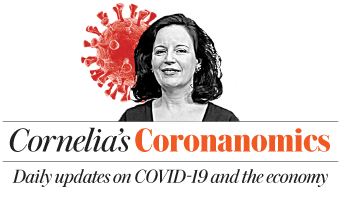The week that was:
In August, US stock markets had their strongest rally in 34 years. On Thursday the Nasdaq fell by 5 percent and the S&P 500 by 3.5 percent. Asian markets followed the downturn with Alibaba, Tencent and others losing in value.

Oil prices are set for the first weekly decline since the end of July and the biggest weekly fall since early June following developments like the stock market declines in the US, a stronger dollar and economies still struggling with COVID-19. Oversupply remains a concern, highlighted by reports that Iraq may seek an extension to implementing compensatory production cuts under the OPEC+ deal. The upcoming refinery maintenance season will result in a temporary demand decline for crude. Midday CET Friday Brent traded at $44.45 a barrel and WTI at $41.82 a barrel.
The German economy, which is the world’s fourth largest and Europe’s largest, is expected to fare better than expected in 2020, only contracting 5.8 percent as opposed to a previously forecast 6.3 percent.
Turkish inflation is soaring as the lira continues its slide. Consumer prices rose by 11.9 percent in August while the currency slid by 5 percent against the dollar. Since January, the lira has depreciated by 19 percent.
According to Bloomberg, food poverty is becoming an issue in the US with 10 percent of households struggling to feed their families. This is the highest number since records began in 1995. Globally, an additional 132 million people could go hungry this year. Oxfam sees famine as a real global issue. By the end of the year 12,000 people could die from famine each day, which raises the possibility of deaths from famine exceeding those from COVID-19, according to the NGO.
A number of potential deals peaked investors’ interest this week:
Abu Dhabi National Oil Company (ADNOC) went into a long-term investment partnership with an Apollo Global Management-led consortium, which took a 49 percent share in ADNOC’s real estate assets valued at $5.5 billion. ADNOC will net $2.7 billion in upfront proceeds on rents from the 24-year lease agreement. ADNOC will continue to manage the business and the consortium will receive dividends from its investment. This is one of the largest real estate transactions in the Gulf Cooperation Council. The deal is expected to close within 2020.
Veolia Environnement SA is in talks to acquire a 29.9 percent stake in Suez Sa in a deal valued at €2.9 billion ($3.4 billion), which would create a world leader in waste and water services.
Spain’s Caixabank is said to be in merger talks with Bankia worth €14 billion, which could lead to an overdue consolidation in the fragmented Spanish banking space. Bank shares in Spain were up on the news.
Tadawul CEO Khalid Abdullah Al-Hussan told Bloomberg that four to five IPOs for 2020 were being worked on at this time.
Focus:
On Thursday the Nasdaq lost $730 billion, down 5 percent, while the S&P 500 lost 3.5 percent. The losses were mainly in the tech space, the question being whether we were dealing with an equity event of investors taking profit or if there was more behind the move.
There might have been a bit of both. Big tech - Apple, Amazon, Alphabet, Facebook and Microsoft - made up 30 percent of the S&P 500 gains since March and account for 20 percent of the index.
At some stage there will be a rotation out of growth stocks into value stocks and cyclicals as the economy comes out of the pandemic. This rotation is yet to take place. However, looking at big tech they may soon have to be classified as value stocks rather than pure growth stocks, as economies increasingly shift toward the digital age.

Markets don’t like uncertainty and the US presidential election inserts that element of uncertainty, which will influence equity markets going forward. Despite different outlooks on taxes and economic management between the Democrats and Republicans, markets are particularly nervous about how a potential transition of power would evolve.
Veteran investor and CEO of Pershing Capital Management Bill Ackman put it well in an interview with Bloomberg where he emphasised that while market valuations looked to the future, near zero interest rates made it impossible to discount future revenue streams. When looking at rapidly growing companies, the inability of reflecting risk in discount rates gave, in his view, bigger weight to a multitude of assumptions for future developments. This becomes difficult as uncertainties grow, leading to increased volatility as we saw on Thursday.
The fact that there was no flight to safe havens like treasuries, gold or the yen seems to indicate that we have not yet reached a final turning point. Traders will watch the August non-farm payroll with great interest.
Where we go from here:
The leader of the US House of Representatives, Nancy Pelosi, and US Treasury Secretary Steve Mnuchin are working together to avoid a government shutdown at the end of September.
US first-time jobless claims for the week ending August 29 came in at 881,000, below the previous week where they stood above a million. Non-farm payrolls for August came in at total job gains of 1.37 million to which the private sector contributed 1.02 million jobs. This brings the unemployment rate down to 8.4 percent, which is still extraordinarily high.

While this jobs report is important, and indicates that the stimulus was working, we have to look at how the job market is developing from here. There is a risk of employees in furlough programs losing their jobs for good going forward. Employees in lower income brackets are particularly at risk, because many work in small and medium-sized enterprises, the hospitality and travel sectors, which have been particularly hard hit.
— Cornelia Meyer is a Ph.D.-level economist with 30 years of experience in investment banking and industry. She is chairperson and CEO of business consultancy Meyer Resources.
Twitter: @MeyerResources
















